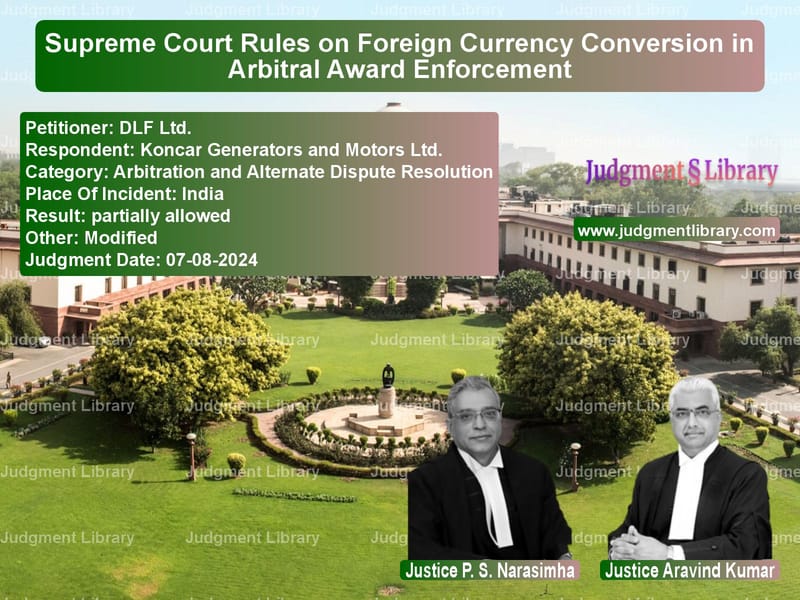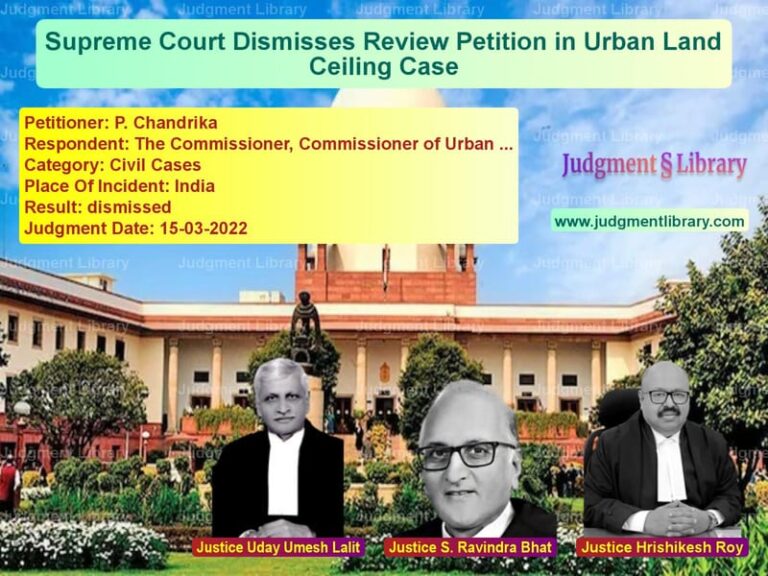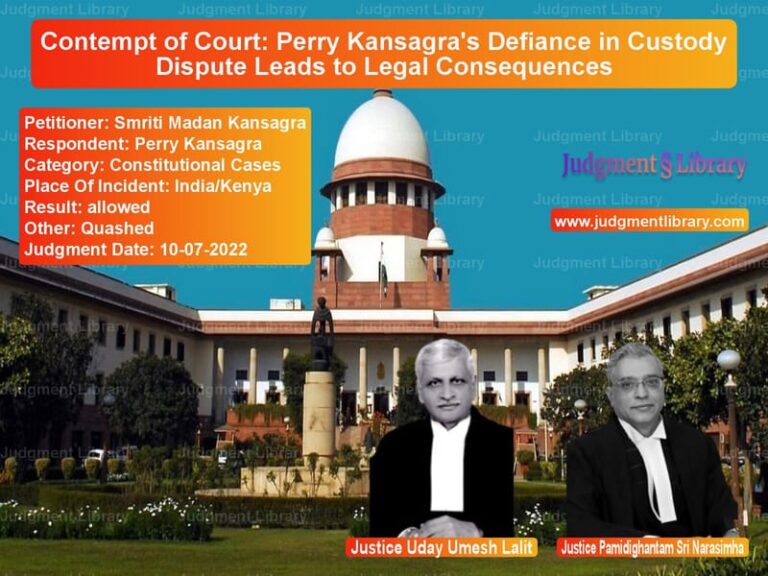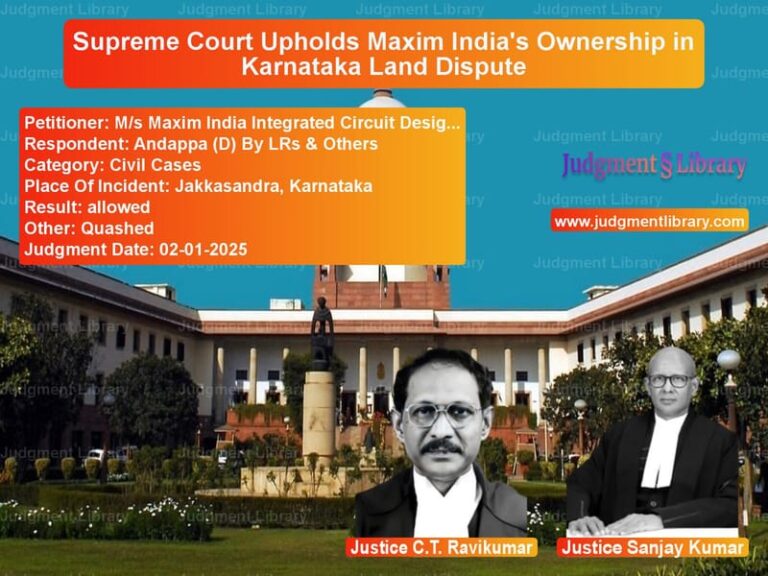Supreme Court Rules on Foreign Currency Conversion in Arbitral Award Enforcement
The case of DLF Ltd. v. Koncar Generators and Motors Ltd. centers around the enforcement of a foreign arbitral award expressed in foreign currency. The Supreme Court had to decide two key issues: first, the correct date for determining the exchange rate to convert the foreign currency award to Indian rupees, and second, the impact of an interim deposit made by the award debtor on the exchange rate calculation.
The judgment provides clarity on how foreign awards are enforced under the Arbitration and Conciliation Act, 1996, particularly in cases involving fluctuating exchange rates and delays in enforcement due to legal challenges.
Background of the Case
Facts Leading to the Dispute
- The respondent, Koncar Generators and Motors Ltd., a Croatian company, entered into a contract with DLF Ltd. for the supply of two generators.
- Disputes arose between the parties, leading to arbitration before the International Chamber of Commerce (ICC) in Paris.
- On May 12, 2004, the arbitral tribunal awarded Koncar a sum of 10,93,989 Euros plus interest.
- DLF challenged the award under Section 34 of the Arbitration Act, but the objections were dismissed on April 28, 2010.
- DLF further filed objections under Section 48, which were ultimately dismissed by the High Court on July 1, 2014, making the award enforceable.
- During the pendency of these proceedings, DLF deposited Rs. 7.5 crores with the Executing Court on October 22, 2010, and an additional Rs. 50 lakhs on July 15, 2011.
- The issue in contention was whether the exchange rate should be determined as of the date of the award, the date of the objections dismissal, or the date of the interim deposit.
Legal Issues Raised
Appellants’ Arguments
DLF Ltd. argued that:
- The exchange rate should be calculated as of the date of their deposit (October 22, 2010, and July 15, 2011) rather than July 1, 2014.
- The deposit was made voluntarily under court orders, and the award holder had the option to withdraw it.
- The respondent should not benefit from currency fluctuations due to procedural delays in the execution of the award.
- The High Court erroneously rejected the precedent set by Forasol v. ONGC, which determined that the conversion date should be the date when the objections are finally dismissed.
Respondents’ Arguments
Koncar Generators and Motors Ltd. contended that:
- The exchange rate should be applied as of July 1, 2014, when the award became enforceable under Section 49 of the Arbitration and Conciliation Act.
- The deposited amount was not withdrawn immediately because the company could not furnish a bank guarantee as required by Indian law.
- The principle in Forasol v. ONGC does not apply since it was decided under the Arbitration Act of 1940, whereas this case falls under the 1996 Act.
Supreme Court’s Observations
Determining the Exchange Rate
The Supreme Court ruled that:
- The appropriate exchange rate for converting the arbitral award should be determined based on the date when the award became enforceable.
- The date of enforceability under the 1996 Act is when objections under Section 48 are dismissed, which in this case was July 1, 2014.
- The principle in Forasol v. ONGC was applicable under the 1996 Act, and the High Court erred in rejecting it.
Impact of Deposited Amounts
The Court distinguished between different types of deposits:
- The Rs. 7.5 crores deposited on October 22, 2010, was made under court orders and was available for withdrawal against a bank guarantee. Therefore, the exchange rate as of that date (1 Euro = Rs. 59.17) would apply to this amount.
- The additional Rs. 50 lakhs deposited on July 15, 2011, could not be withdrawn until the objections were resolved. Hence, the exchange rate as of July 1, 2014, should apply to this deposit.
- The remaining balance of the award amount would also be converted based on the exchange rate on July 1, 2014.
Final Judgment
The Supreme Court held that:
- The High Court’s ruling that the exchange rate as of July 1, 2014, applied to the entire award amount was incorrect.
- Instead, the exchange rate on October 22, 2010, should apply to the first deposit of Rs. 7.5 crores.
- The exchange rate on July 1, 2014, should apply to the additional Rs. 50 lakh deposit and any remaining balance.
- The executing court must recalculate the amount due based on these principles.
This judgment provides clarity on how foreign arbitral awards are enforced in India and ensures that award creditors do not unfairly benefit from exchange rate fluctuations when the award debtor has already made substantial deposits.
Petitioner Name: DLF Ltd..Respondent Name: Koncar Generators and Motors Ltd..Judgment By: Justice P. S. Narasimha, Justice Aravind Kumar.Place Of Incident: India.Judgment Date: 07-08-2024.
Don’t miss out on the full details! Download the complete judgment in PDF format below and gain valuable insights instantly!
Download Judgment: dlf-ltd.-vs-koncar-generators-an-supreme-court-of-india-judgment-dated-07-08-2024.pdf
Directly Download Judgment: Directly download this Judgment
See all petitions in Arbitration Awards
See all petitions in International Arbitration
See all petitions in Enforcement of Awards
See all petitions in Judgment by P.S. Narasimha
See all petitions in Judgment by Aravind Kumar
See all petitions in partially allowed
See all petitions in Modified
See all petitions in supreme court of India judgments August 2024
See all petitions in 2024 judgments
See all posts in Arbitration and Alternate Dispute Resolution Category
See all allowed petitions in Arbitration and Alternate Dispute Resolution Category
See all Dismissed petitions in Arbitration and Alternate Dispute Resolution Category
See all partially allowed petitions in Arbitration and Alternate Dispute Resolution Category







